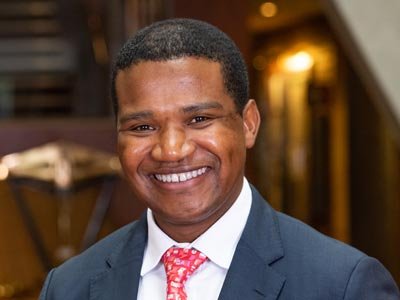News
AngloGold Ashanti marks Africa Day … pledges to sustain fight against COVID-19

AngloGold Ashanti marked this year’s Africa Day with a commitment to help sustain efforts to fight COVID-19 pandemic on the continent.
The company made the pledge when it joined more than 1.2 billion Africans across the continent and in the diaspora on Monday, to mark Africa Day, at a time the African Union (AU) was spearheading several initiatives aimed to combat the spread of COVID-19 and ensure Africa’s economic resilience.
The Chief Operating Officer for Africa, Sicelo Ntuli, in a statement released to the Ghanaian Times, said: “AngloGold Ashanti is committed to supporting the AU in its response strategy and is working in cooperation with the respective government programmes and stakeholders to roll out a series of hygiene and educational interventions at its sites and across communities.”
The theme for this year’s Africa Day, “Silencing the guns; Creating a conducive environment for Africa’s development”, in part, provided the relevant framework to all stakeholders, including governments, the private sector, civil society and academia to join forces in the fight against the pandemic, ensuring that livelihoods were protected and economic activity kept alive.
In March, this year, Africa’s leaders met and developed a comprehensive, continent-wide response strategy to COVID-19.
This is to enhance collaboration and communication on the pandemic by member states and partners, including Africa Centre for Disease Control (CDC), which specialises in efforts to strengthen health systems and improve surveillance, emergency response, prevention and control of diseases in AU member states.
Mr Ntuli said: “AngloGold Ashanti aims to support the countries in which we operate to fight the COVID-19 pandemic. The company continues to work closely with governments and communities and has rolled out a number of interventions to keep people safe.”
He congratulated all Africans on the occasion of Africa Day and pledged that AngloGold would continue to work to support governments and communities where it operates.
Mr Ntuli said the company had introduced measures to prevent the spread of COVID-19, including stepping-up screening and surveillance of employees, banning non-essential travel, instituting clear self-quarantine measures and increasing hygiene awareness and facilities.
He mentioned that in Ghana, AngloGold Ashanti Malaria Control has disinfected health centres, markets and carried out education campaign on COVID-19 in the Obuasi municipality.
Mr Ntuli said the Obuasi and Iduapriem Mines had donated funds through the Ghana Chamber of Mines, which had provided US$2million to the government of Ghana to fight COVID-19.
He said Iduapriem had created an isolation centre in Tarkwa, developed a comprehensive COVID-19 education campaign and increased the number of hand-washing facilities at site and in host communities. It had, also provided medical equipment and PPE. “
He said about US$1 million would be spent on reducing the effects of COVID-19, at Iduapriem.
FROM CLEMENT ADZEI BOYE, TAKORADI
News
Man sentenced to 25 years for robbery at Manso Akwasiso

A 30-year-old man has been sentenced to 25 years imprisonment with hard labour by the Bekwai Circuit Court for his role in a 2022 robbery at a mining site at Manso Akwasiso in the Ashanti South Region.
The convict, Dominic Ofori, also known as Fanta, was arrested on 16th February 2026 after years on the run. He pleaded guilty before the Bekwai Circuit Court to robbery contrary to Section 149 of the Criminal Offences Act, 1960 Act 29, and was accordingly sentenced to 25 years imprisonment with hard labour.
On March 20, 2022, the Manso Adubia District Police received intelligence that a group of armed men from Manso Abodom were planning to attack a mining site at Manso Akwasiso to rob the owner of gold concentrate. Acting on the information, police mounted a coordinated operation and laid an ambush at the site.
At about 5:30 pm the same day, four-armed men arrived at the site, fired indiscriminately, and robbed the miners of their gold concentrate. The police team on surveillance intervened, resulting in an exchange of gunfire.
Three of the suspects, Abu Abubakar, Musah Latif, and Gideon Takyi, sustained gunshot wounds and were pronounced dead on arrival at St Martins Catholic Hospital at Agroyesum. Dominic Ofori escaped at the time but was later arrested and put before the court.
The Ashanti South Regional Police Command has assured the public of its continued commitment to combating violent crimes and bringing offenders to justice.
News
Ashanti police arrest man for publishing false news on TikTok

The Ashanti Regional Police Command has arrested 45-year-old Isaac Boafo, also known as “Duabo King,” for allegedly publishing false news intended to cause fear and panic.
Police said the arrest follows a viral TikTok video in which Boafo claimed that four officers at the Central Police Station in Kumasi engaged in inappropriate conduct with commercial sex workers during night patrols in Asafo.
Officers from the Police Intelligence Directorate (Ashanti Region) apprehended Boafo after receiving intelligence about the video.
During questioning, he admitted to creating the video to attract views and engagement online, and acknowledged that he could not prove the allegations.
Boafo also admitted making comments about the President of the Republic for content purposes and could not defend those statements.
He has been formally charged and is in detention as investigations continue.
The Ashanti Regional Police have warned the public against publishing or sharing false information on social media, noting that such acts can cause fear, panic, and damage reputations.
They said anyone found engaging in similar conduct will face legal action.
By: Jacob Aggrey






